Indrajit
Indrajit or Meghanada, according to Hindu texts, was a prince of Lanka and possessor of Indra loka (Heaven). He is regarded as one of the greatest warriors in Hindu texts. He was mentioned in the Indian epic Ramayana. Indrajit played an active role in the great war between Rama and Ravana. He is considered as one of the Atimaharathi class warriors born on the earth as told in the Ramayana, Mahabharata, Puranas and the Vedas. He possessed 3 deadly and powerful weapons: Brahmastra, Vaishnavastra and Brahmanda astra. He acquired many kinds of celestial weapons from his Guru Shukra. He defeated the Gods (Devas) in the heaven.[1] Using Brahmandastra, Indrajit killed 670 million Vanaras in a single day; nearly exterminating the entire half vanara race. No warrior on the Earth achieved this statistical feat in Ramayana[1][2]
| Indrajit / Meghanad | |
|---|---|
| Ramayana character | |
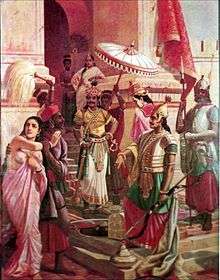 Victory of Meghanada by Ravi Varma | |
| In-universe information | |
| Nickname | Shakrajit, Ravani, Vasavajit, Varidanada, Ghananada |
| Family | Ravana (father) Mandodari (mother) Atikaya, Akshayakumara, Narantaka, Devantaka, Trishira (brothers) |
| Spouse | Sulochana |
| Home | Lanka |
Etymology
In Sanskrit literal translation the name "Indrajit" (इन्द्रजित्) mentioned as "Conqueror of Indra" and "Meghanād" (Sanskrit: मेघनाद) as "Thunderous or lord of sky".In bengali ইন্দ্রজিৎ In Tamil literal translation of the name "Meghanathan" [3] (Tamil: மேகநாதன்) is mentioned as "Lord of Clouds", which combines the words "Megham" (clouds) and "Nathan"/"nathudu" (lord). He defeated Indra, the king of the Devas, after which he came to be known as "Indrajit" (the conqueror of Indra).[4] He is also known as Shakrajit, Ravani, Vasavajit, Varidanada and Ghananada.
Early Life
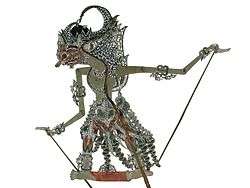
Indrajit was the eldest son of Ravana and his wife Mandodari. He was named Meghanada after his birth because his birth cry sounded like thunder. When Meghanada was going to be born, Ravana wished his son to be supreme so that no one in the world could defeat him. Ravana wanted his son to be the ultimate warrior and extremely knowledgeable. Ravana was a great astrologer. To make his son immortal, he commanded all the planets and constellations in such a position that would allow his son to be born the way he wanted. Because of Ravana's anger and power, all the planets and constellations feared him. All the planets were in the position as desired by Ravana at time of his son Meghanada's birth. All the planets aligned in such a way that they came in the 11th house of Meghanada's horoscope.[5] However, Shani (Saturn) had disobeyed Ravana's orders and had settled in the 12th house of Meghanada's horoscope. Ravana became furious at this and lamed Shani. Due to the state of Shani, Meghanada had to die at the hands of Lakshmana in the war between Rama and Ravana.
At a very young age, Meghanada became the possessor of three devastating celestial weapons: Brahmanda astra, Brahmastra and Vaishnavastra. Meghanada was also an expert in magical warfare, sorcery and tantra. He was married to Sulochana, the virtuous daughter of the King of the serpents, Shesha Naga.[4]
Brahma's boon
During the battle between the Devas and Ravana, Lord Indra, king of heavens accompanied by all other devas captured Ravana. To rescue his father, Meghanada attacked Indra and his elephant Airavata, and defeated all the Devas, even Indra. Meghanada tied and mounted Indra onto his celestial chariot and brought him to Ravana in Lanka. Ravana and Meghanada decided to kill Indra. At this juncture, Lord Brahma intervened and asked Meghanada to free Indra. Meghanada obliged and was granted a chance to ask for a boon from Brahma. Meghanada asked for immortality, but Brahma remarked that absolute immortality is against the law of the nature. Instead, he was then granted another boon that after the completion of the Yagna (fire-worship) of his native goddess Prathyangira or the "Nikumbhila yagna" would be completed, he will get a celestial chariot, mounting on which, any enemy can't kill him in a war and become invulnerable. But Brahma also cautioned him that whosoever would destroy this yagna, would also kill him. Brahma was highly impressed by Meghanada's valor in this war and it was Brahma who coined him the name Indrajit ("the conqueror of Indra"). It is also believed that Meghanada was granted another boon by Brahma in which it was promised to him that he would only be killed by a common man who hadn't had sleep for 12 years continuously.[6]
Role in battle
Meghanada was the greatest and the most furious warrior on Ravana's side. He was a great archer and unsurpassed grand master in illusion warfare techniques.
First Day
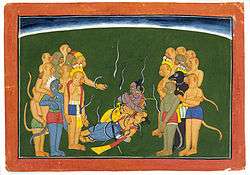
On the first day of his battle with Rama's army, Indrajit was fast with his weapons. He swiftly wiped out the armies of Sugriva, calling on Lord Rama and Lakshmana to come in a direct combat, so he could avenge the deaths of his paternal uncle and his brothers. When Lakshmana appeared before him, he fought fiercely and used his most nefarious weapon Nagapash (a trap made of a million snakes). Rama and Lakshmana fell on the ground breathless. They were rescued by Garuda on behest of Hanuman. Garuda was the uncle of Jatayu and Sampati and the enemy of the serpents and also the flying vehicle of Vishnu, of whom Rama was the seventh avatar.
Second Day
When Indrajit came to know that both Rama and Lakshmana had been rescued by Garuda and were still alive, he was livid and vowed to kill at least one of the brothers on that day. When the battle started, he used all his force to cast a havoc on the armies of Sugriva. At this Lakshmana appeared before him and fought a fierce battle with him. Indrajit used his supreme magical powers, darting across the clouds and skies like a bolt of lightning. He combined his skills of sorcery and illusion warfare, repeatedly vanishing and reappearing behind Lakshmana's back. He was invisible but his arrows injured Lakshmana. Indrajit used the Vasavi Sakthi against Lakshmana, and upon being impaled Lakshmana fell unconscious, poised to die precisely at the following sunrise. His life was saved by Lord Hanuman, who brought the whole mountain of Dronagiri from the Himalayas to Lanka overnight to find the remedy (the magical herb - Sanjivani) for the weapon used by Indrajit and cured him. Although there is speculation that Rama too fought but it is not true. Dharma does not allow multiple warriors to fight against one and it was only Lakshmana who got injured because it is against moral duty to fight against an invisible warrior.
Third day
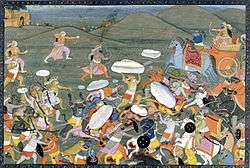
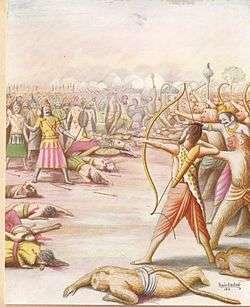
When Indrajit came to know that Lakshmana had survived again, he went to his native deity's secret temple to perform the yagna that would make him warrior- who can't be killed by anyone. Vibhishana, Indrajit's paternal uncle who left Ravana to join Rama, learned of his nephew Indrajit's plans through his spies and alerted Rama. Lakshmana and Vibhisana took the opportunity to face Indrajit in the "Yagnaagaar", where Indrajit would not touch any weapons. As the Valmiki Ramayana quotes, upon his Yagna being destroyed by the armies of Lakshmana, Indrajit became enraged and stormed out of the Temple Cave. Indrajit fought Lakshmana with the utensils of the yagna.[4] Seeing his uncle Vibhishana at Lakshmana's side multiplied Indrajit's fury manyfold. He vowed to kill his uncle Vibhisana along with Lakshmana once and for all, letting loose the Yama-astra which he had been conserving for punishing Vibhishana's perceived treason. At this juncture, Lakshmana protected Vibhishana, countering the Yama-astra owing to an earlier warning by Kubera. A fierce battle ensued and Indrajit used Vaishnavastra on Lakshmana. To Indrajit's surprise and dismay powerful Vaishnavastra circumambulated Lakshmana before disappearing. Realization dawned on Indrajit that Lakshman was not an ordinary human and had met the criteria to defeat Indrajit, i.e. blunder the yagna and not sleep for 12 years. Indrajit vanished briefly from the battlefield, returning to Ravana at the royal palace, and reported the developments, proposing that his father make peace with Rama. Ravana blinded with pride was unrelenting and annoyed, claiming that Indrajit was a coward for having fled the battlefield. This accusation provoked Indrajit who briefly lost his temper, striking fear even at the mighty Ravana's heart before apologizing and clarifying to his father that his primary duty as a son was to serve his father's best interests and that even in the face of death, he would never abandon Ravana. Preparing to go back to the battle and knowing that he indeed faced death at the hands of a heavenly incarnation, Indrajit said his last goodbyes to his parents and his wife. He returned to the battlefield and fought Lakshmana with all his skill at both illusion warfare and sorcery. The arrows of Indrajit refused to harm Lakshmana because Lakshman was the incarnation of Sesha Naga. Lakshmana slew Indrajit by beheading him with the Anjalikastra. It was possible only because of a curse given to Indrajit by Sesha Naga for marrying his daughter without his permission. Sesha Naga incarnated as Rama's brother Lakshmana, to kill Indrajit, didn't have any sleep for twelve years during their exile so that he would be able to serve Rama and Sita efficiently and meet the criteria to kill Indrajit. .[4]
See also
- Valmiki
- Ramayan
- Meghnad Bodh Kavya
- Hindu mythological wars
- Patalkot, India
References
| Wikisource has original text related to this article: |
- C. G. Uragoda (2000). Traditions of Sri Lanka: A Selection with a Scientific Background. Vishva Lekha Publishers. ISBN 978-955-96843-0-5.
- George M. Eberhart (1 January 2002). Mysterious Creatures: A Guide to Cryptozoology. ABC-CLIO. p. 388. ISBN 978-1-57607-283-7.
- Kamba Rāmāyanam: an English prose rendering (1996), p. 20.
- http://www.sacred-texts.com/hin/rama/
- "Ravana and Shani fight over the horoscope of Meghanada". Retrieved 2 December 2015.
- B. A van Nooten William (2000). Ramayana. University of California Press. ISBN 978-0-520-22703-3.CS1 maint: ref=harv (link)
.jpg)